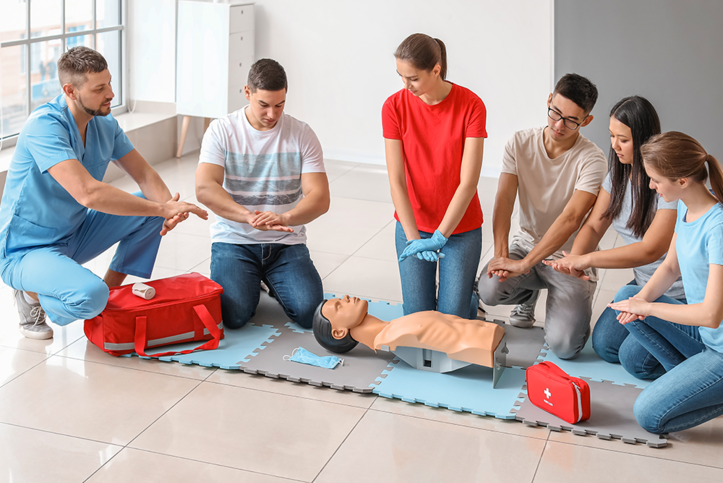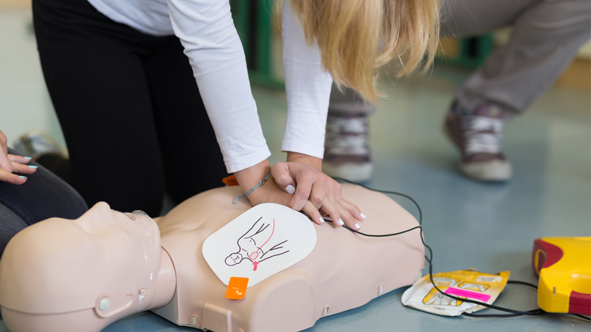Why?
If an accident happens in the workplace, it is crucial that someone can administer first aid. In companies with fewer than 20 employees, 'designated persons' must be present. You do not need a first aid certificate but you must have a basic knowledge of first aid.
Mensura is accredited by the FPS Employment, Labour, and Social Dialogue to organise this training. Afterwards, you receive a certificate of participation, which is valid in Belgium.
Do you have 20 or more employees?
Then you must have certified first aiders. They provide initial care in case of accidents at work on the company premises. Mensura is authorised to organise this first aid course. Afterwards, you receive a certificate.
Read more about the courses 'Emergency response officer (first aid) - basic level' and 'Refresher training emergency response officer (first aid)'.
What do you learn?
In this course, you learn the basic principles and skills of first aid with a focus on the role of the carer providing first aid. Topics include basic hygiene, analysis of the situation, procedures, administering care before evacuation, and the basics of first aid (bleeding, wounds, burns, etc.).
1. Introduction
Role of the first aider
Legislation and practical implications
First aid register
Demonstration: first aid equipment
2. General approach to emergency situations
Safety and hygiene
Monitoring of vital functions:
- Consciousness
- Respiration
- Circulation
Raising the alarm
- Notifying emergency services.
Approaching victim(s) and additional first aid
- Comforting for the victim
Practical exercise: step-by-step plan
3. The vital functions and clinical symptoms
Loss of consciousness
- Stroke
- Carbon monoxide poisoning
Respiration
- Asphyxiation
Circulation
- Angina
- Heart attack
Practical exercise: stable side position
Demonstration: hyperventilation, suffocation – blows to the back – abdominal thrust, heart attack
4. Basic resuscitation
Resuscitation '30:2'
Use of an AED
Practical exercise: Resuscitation '30:2' and use of an AED
5. Types of bleeding and shock
External bleeding
Internal and external bleeding
Shock
Practical exercise: compression bandage
Demonstration: nosebleed
6. Injuries to the locomotor system
Sprain
Practical exercise: wrist bandage and triangular bandage as a sling
7. Skin wounds
Abrasions
Cuts
Splinters
Blisters
Practical exercise: disinfection of a wound and bandaging a finger
8. Burn wounds
Skin burns
Practical exercise: triangular bandage as a temporary cover
9. Eye injuries
Eyewash
10. Poisoning
Poisoning
Certificate of participation for designated persons
At the end of this training, you will receive the certificate of participation for designated persons recognised by the Federal Public Service Employment, Labour, and Social Dialogue (FPS WASO).
I enjoyed the training, especially the video set. It's even better than offline training!"Inga Melnik OpenWay
This course is part of our Interact-offer

Talk to an expert, share your experiences, and learn from each other. Learning is a social experience. You learn to apply basic knowledge in practice, both online and in the classroom.
Result?
After this training, you will have mastered the basics of first aid. So you will know how to administer first aid in the workplace. In concrete terms, this course will teach you:
- Provide first aid.
- Support, protect and move a victim.
- Resuscitate and use the Automatic Electrical Defibrillator (AED).
- Provide Basic Life Support (BLS) including checking the victim, chest compressions, breathing and putting the victim into the recovery position.
- Assist with unconsciousness.
- Recognise and treat burns and skin wounds
- Treat (nose) bleeding.
- Intervene in case of poisoning.
- Treat a sprain.
- Provide assistance in case of stroke and heart attack.
- Apply different bandaging techniques.
We work with continuous evaluation during the training.
Afterwards, you will receive the certificate of participation for designated persons recognised by the Federal Public Service Employment, Labour, and Social Dialogue (FPS WASO).
Renew your certificate after 3 years
The certificate for designated persons is valid for 3 years. We therefore advise you to follow this training every 3 years.
For whom?
This course is for 'designated persons' in companies with fewer than 20 employees. They are responsible for administering first aid in case of an accident.
Know that first aid must always be guaranteed, for example, also at night when working in shifts.
Responsible for both emergency assistance and fire safety?
Then our 'Combi emergency response (first aid) and fire safety' course is for you. In this course, you acquire the relevant skills in one day so that you can take appropriate measures in the event of an accident or starting fire.
What does the law say?
As an employer of a company with fewer than 20 employees (i.e. group D), you must ensure that there is always one or more employees present in the workplace to administer first aid in case of an accident or health problem (the 'designated persons'). A first aid certificate is not required but they must have mastered the basic principles and skills of first aid.
Know that first aid must always be guaranteed. That means at night too in the case of shift work.
Mensura is listed by the Federal Public Service on Employment, Labour and Social Dialogue (FPS WASO) as a training institution that provides this refresher course.
Price
The price depends on how you follow the training.
If your organisation is affiliated with Mensura External Service for Prevention and Protection at Work (ESPPW) and you have prevention units, you can pay with these as long as your balance is sufficient.
Options:
- Training courses can be held in the evening or at the weekend for an additional fee.
You can indicate your interest in the options in your request for a quote.
Subsidies and financing options
We qualify for all kinds of subsidies and financing options because we are certified by many government agencies and sector funds.
- SME-Portfolio. Use these certification numbers in your request:
- members of Mensura External Department for Prevention for Prevention and Protection: Mensura EDPB - DV.O105072
- non-members: Mensura CONSULT - DV.O101943
- Training cheques - Wallonia
- Sector fund
- Alimento
- Constructiv
Frequently Asked Questions
What is the difference between an initiation, a refresher course, and a basic course?
An initiation is an awareness training for all staff in your company. This ensures everyone reacts appropriately in the event of an accident. You do not receive an official certificate.
After a basic course, you receive a certificate and are then a first aider in your company. You retain that certificate on completion of the mandatory annual refresher course.
How many first aiders are needed in my organisation?
This is determined by the risk analysis. You can find a recommendation per sector here.
Is something unclear? Then contact your external Mensura prevention adviser.





